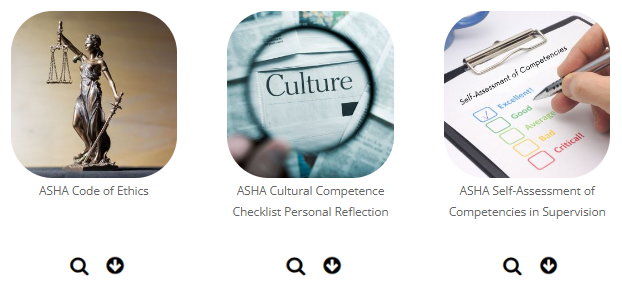The experience of being a supervisor for speech language pathology can be one of the most rewarding experiences in our careers. It is an amazing way to give back to a field that has done so much for us and to welcome new colleagues into the field. For some of us, we want to be exactly like that speech therapy supervisor we had who made our experience incredible. For others we want to create the experience for a student, clinical fellow, or SLP-A that we wish he had!
Bilinguistics is proud to have played a part in bringing dozens of students, graduate students, and clinical fellows into the field. We’ve published the resources that we use when we are supervising so that you have access to the forms. Check out this supervisor resource page and bookmark it.

Here are a few things we have learned along the way that keep us motivated and signing back up to supervise again and again.
#1. Be a Speech Therapy Supervisor That Grows Professionally Alongside Your Students
As a speech therapy supervisor, your role extends far beyond overseeing clinical practice; it involves nurturing the growth and development of future professionals in the field. One of the cornerstones of effective supervision is professionalism. According to ASHA’s framework for competencies in supervision, professionalism encompasses various facets, including maintaining ethical standards, fostering a culture of lifelong learning, and demonstrating accountability in one’s practice.
Supervisors must lead by example, embodying the principles they wish to instill in their supervisees. This involves staying abreast of current research, participating in continuing education opportunities, and actively seeking feedback to continuously improve. And what better way than to interact with a student who just learned about the most recent advancements in the field of speech-language pathology? By prioritizing their own professional growth, supervisors not only enhance their expertise but also inspire and motivate their students to do the same.
Action Step: Use ASHA’s Self-Assessment of Competencies in Supervision to see your strengths and needs as a supervisor. Some of the questions show us areas where we can continue to grow and remind us why we would make great clinical supervisors in the first place.
#2. Be a Speech Therapy Supervisor That Builds Emotional Strength
Emotional strength is a vital attribute for any supervisor in the speech therapy field. Imposter syndrome, a phenomenon where individuals doubt their abilities and feel like a fraud despite evidence of success, is not uncommon among supervisors. It’s essential to acknowledge and address these feelings openly, creating an environment where vulnerability is embraced rather than shunned.
Sometimes it’s not exactly clear what emotional strength is or how to support it from a professional standpoint. A framework for evaluating emotional strength includes considerations for imposter syndrome, vulnerability, and bias.
Imposter Syndrome
Imposter syndrome is a common experience among speech therapy supervisors, characterized by feelings of inadequacy and self-doubt despite evidence of competence and success. It’s essential for supervisors to recognize and address imposter syndrome openly, both for their own well-being and for the benefit of their supervisees. By acknowledging and normalizing these feelings, supervisors can create a supportive environment where vulnerability is embraced rather than stigmatized. Encouraging honest self-reflection and self-compassion allows supervisors to confront imposter syndrome head-on and model healthy coping mechanisms for their supervisees.
Vulnerability
Vulnerability is a key component of effective supervision, allowing supervisors to connect authentically with their supervisees and foster a culture of openness and growth. By sharing personal stories of challenges faced and lessons learned, supervisors demonstrate that vulnerability is not a weakness but a strength. This transparency creates a safe space for supervisees to express their own doubts and insecurities without fear of judgment, facilitating deeper trust and collaboration in the supervisory relationship. Supervisors who embrace vulnerability not only cultivate resilience within themselves but also empower their supervisees to navigate challenges with courage and authenticity.
Bias
Addressing bias is another critical aspect of effective supervision, ensuring that all supervisees receive equitable support and guidance regardless of background or identity. But it’s tricky because our own personal biases can be quite hidden. The Harvard Implicit Bias Tool can be a valuable resource for supervisors to uncover unconscious biases that may impact their perceptions and interactions with supervisees. By raising awareness of these biases, supervisors can take proactive steps to mitigate their influence and create a more inclusive learning environment. Embracing diversity and cultural competence not only enhances the quality of supervision but also fosters a sense of belonging and acceptance among supervisees, enabling them to thrive professionally.
Action Step: Demonstrate your own vulnerability by talking about (way back!) when you began and any uncertainty that you felt. Share how you may have woken up to biases you have carried into the job based on where you are from or how you grew up and how you overcame them.

#3. Address the Mental Hurdles of Becoming a Full-time Educator or Health Professional
Transitioning from a student to a full-time professional in the field of speech therapy can be mentally challenging. Supervisors play a crucial role in preparing their supervisees for the realities of the profession, including the potential for burnout and overwhelm. It’s essential to have open and honest conversations about the stressors inherent in the field and equip supervisees with coping strategies to navigate these challenges effectively.
“A recent study found that 93% of health care workers reported stress, 86% reported anxiety, 77% reported frustration, 76% reported exhaustion and burnout, and 75% said they were overwhelmed. Yet just 13% of front-line health care workers say they received behavioral health services.”
Workforce Strategies on Behavioral Health
Research indicates a concerning prevalence of stress, anxiety, and burnout among healthcare workers, underscoring the importance of prioritizing mental well-being. Supervisors should encourage self-care practices and provide resources for support, such as access to behavioral health services. Furthermore, clinical supervisors must assess their own suitability for the role, recognizing that effective supervision requires a genuine desire to mentor and support others.
Action Step: Be honest about what the shortcomings or challenges that the field of speech pathology faces. Every profession has their own difficulties. How have you adapted and what have you accepted to have done this job as long as you have? Share this important, unfiltered, positive information.
#4. Understand Your Leadership Role and Power Dynamics
Supervision entails a unique blend of teaching, mentoring, and leadership. As a supervisor, you wield influence and authority over your supervisees, which necessitates a nuanced understanding of power dynamics. While it’s natural for supervisees to seek approval and validation from their supervisors, it’s crucial to create a safe and supportive learning environment where mistakes are viewed as opportunities for growth rather than judgment.
The good news is: You have so many relevant skills to impart on this new SLP!
Drawing on transferable skills from clinical practice, supervisors can effectively navigate their leadership role. Adaptability, communication skills, and cultural competence are invaluable assets in guiding supervisees through their professional journey. By fostering a collaborative and respectful relationship, supervisors can empower supervisees to develop their clinical skills and cultivate confidence in their abilities.
The way you interact with them is important. You are the mentor because you know more, yes, but you do not want to intimidate the student. You want to create a safe space for learning, where the student can feel free to mess up and grow.
Action Step: Ask yourself this: How can one interaction today be transformed from a “teachable moment” to a collaborative moment?
Top 6 Benefits of Becoming a Clinical Supervisor
Supervising in the field of speech therapy is not merely a responsibility but a privilege. It offers the opportunity to shape the next generation of professionals while continuing to grow and learn oneself. By prioritizing professionalism, emotional resilience, mental well-being, and effective leadership, supervisors can create an enriching and fulfilling experience for both themselves and their supervisees. Ultimately, the success of supervision lies in the cultivation of a supportive and nurturing environment where learning flourishes, and professionals thrive. Here is why we love being a speech therapy school supervisor as well as oversee CFs in our clinic:
- The experience of supervising for speech language pathology can be one of the most rewarding experiences in our careers.
- It’s an opportunity to share a lifetime of knowledge and give back to a field that has given us so much by contributing to the growth of another professional
- Grad students and CFs have just learned about the latest research and best practices so it is a quick way to us to get back up to speed by learning from them.
- It’s fun to connect with local universities and find out about speakers or events that they have planned.
- The time that the supervisee spends with our caseload and evaluations, can free us up to spend more time with students or clients who need it, plan for sessions, and complete needed paperwork.
- And in the best of circumstances, we have a new friend and colleague for life who is great to see at staff meetings or run into at conferences.
But the truth is that to make the experience successful and enjoyable, we need tools, documentation, and processes to meet the requirements and make it run smoothly. That’s why we created a special 2-hour course: The Tools, Documents, and Framework for a Successful SLP Supervision Experience. Watch this summary video and then earn ASHA CEUs while learning how to supervise effectively.




